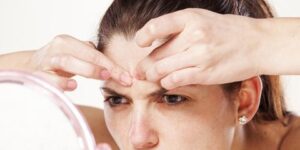Home Remedies for Pimples and Prevention Tips
Written by Jessica Lal on March 28, 2022

The occurrence of pimples on the skin is a problem faced by many people, commonly in their teenage years. These inflamed, red bumps form due to blockage and infection in the oil glands in the hair follicles.
The pimples may either be papular, which are mild and without pus, or pustular, characterized by the formation of pus due to the action of white blood cells.
While severe cases of pimples require medical attention, mild cases can be treated at home with self-care and home remedies.
Home Remedies to Treat Pimples
1. Apply a honey mask
Honey is widely used for acne treatment due to its high sugar and antioxidant content that exhibits antimicrobial and anti-inflammatory properties.
It is best to use raw, organic, or medical-grade honey as spot treatment or to make a face mask with other antibacterial ingredients such as turmeric and cinnamon.
How to use:
- Wash your face with a mild cleanser or scrub.
- Mix 1 tsp of cinnamon or turmeric with 2 tbsp honey, and apply the mixture to your face.
- Wash the mask after 15–20 minutes.
2. Use turmeric
Since pimples result from inflammation due to bacterial infection, the anti-inflammatory nature of curcumin, the active ingredient of turmeric, can help reduce the severity of pimples.
How to use:
- Mix 1 tbsp of turmeric with water, honey, or lemon juice to form a thick paste. Use this paste on the affected areas and allow to dry for a few minutes before washing it off with tap water. Repeat this remedy twice a day for a week.
- Consume turmeric milk daily at bedtime to help accelerate skin repair and pimple healing.
3. Use neem topically
Neem possesses antiseptic, antifungal, antibacterial, and anti-inflammatory properties. It also acts as an astringent that can help remove excess sebum from the skin, preventing the formation of pimples. It can even dry out existing pimples.
How to use:
- Grind a few neem leaves to form a paste and mix in ½ tsp of turmeric powder. Apply the paste to the affected area and rinse with lukewarm water after 20 minutes.
- Boil neem leaves in water to form an antiseptic solution, and use it to wash your face.
Self-Care to Manage Pimples
Along with medical or at-home treatment, it is vital to observe some self-care measures for effective pimple management, including the following:
- Cleanse your skin. Cleanse your skin using a mild cleanser or nondrying soap and lukewarm water twice a day. You can also use benzoyl or salicylic acid to help control oil production. Also, make sure to remove all makeup before sleeping.
- Steam. Steaming your face can help remove bacteria, oil, and dirt from your pores, thus allowing your skin to breathe.
- Apply a cold compress. Applying ice to the face helps improve blood circulation, reduces inflammation, and helps manage the pain caused by pimples. Moreover, freezing the clogged pores helps in effectively cleansing the skin.
- Avoid touching your face. Touching your face repeatedly can spread the infection and increase the chances of recurrence.
- Do not pick your pimples. Scratching, picking, rubbing, squeezing, or popping your pimples increases the risks of scars and delays healing.
- Protect your skin from the sun. Since acne treatment medications make your skin prone to skin burn, it is advised to use sunscreens before stepping outside.
Preventive Measures
While pimples cannot be completely avoided during puberty or in the case of endocrine disorders, the following preventive measures can help reduce pimple breakouts and recurrence:
- Keep your skin clean. Cleanse your skin twice a day with a mild cleanser. Avoid using harsh soaps or scrubs as it can aggravate the condition. Rinse your face with water every time you exercise or sweat to prevent clogging of pores. Clean off makeup every night to allow your skin to breathe.
- Use non-acnegenic skin products. Choose only noncomedogenic and non-acnegenic lotions, creams, and makeup products.
- Avoid hair sprays. If you use hair sprays or styling gels, take care to avoid contact with your skin.
- Manage your hair. Keep your hair out of your face and wash it daily if it is oily.
- Do not use harsh products. Avoid the use of alcohol-based products, toners, or astringents on your skin as they can dry out the skin, often resulting in increased sebum release.
- Keep your makeup tools clean.
- Wear loose clothes. If you develop acne on your back or chest, avoid wearing tight clothes.
- Exfoliate. Use a gentle scrub to exfoliate your skin weekly. You can prepare oatmeal, cocoa, or yogurt scrubs at home to prevent the buildup of dead skin cells and oil inside the pores.
source : 







